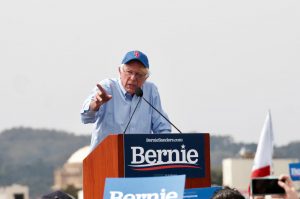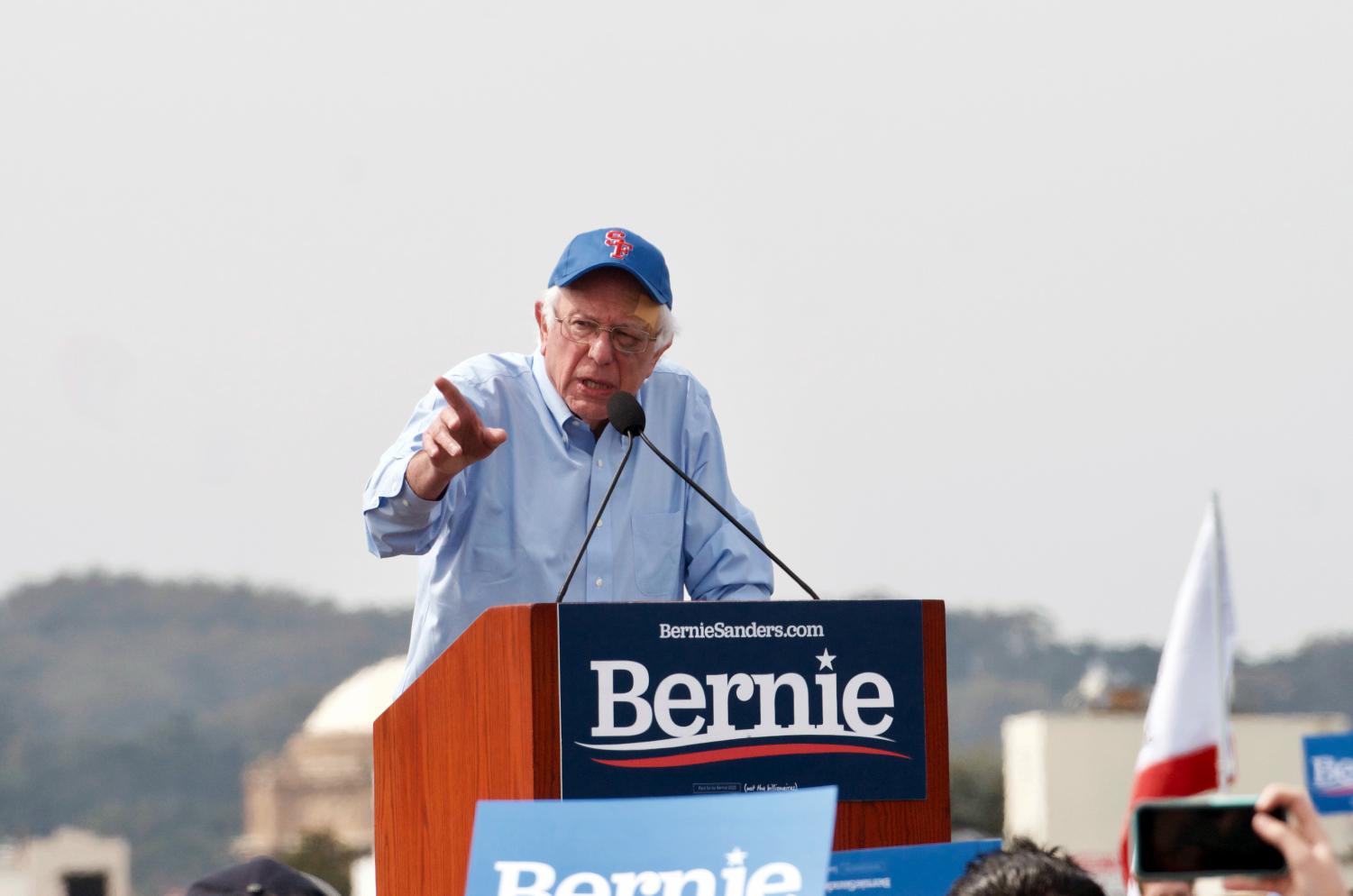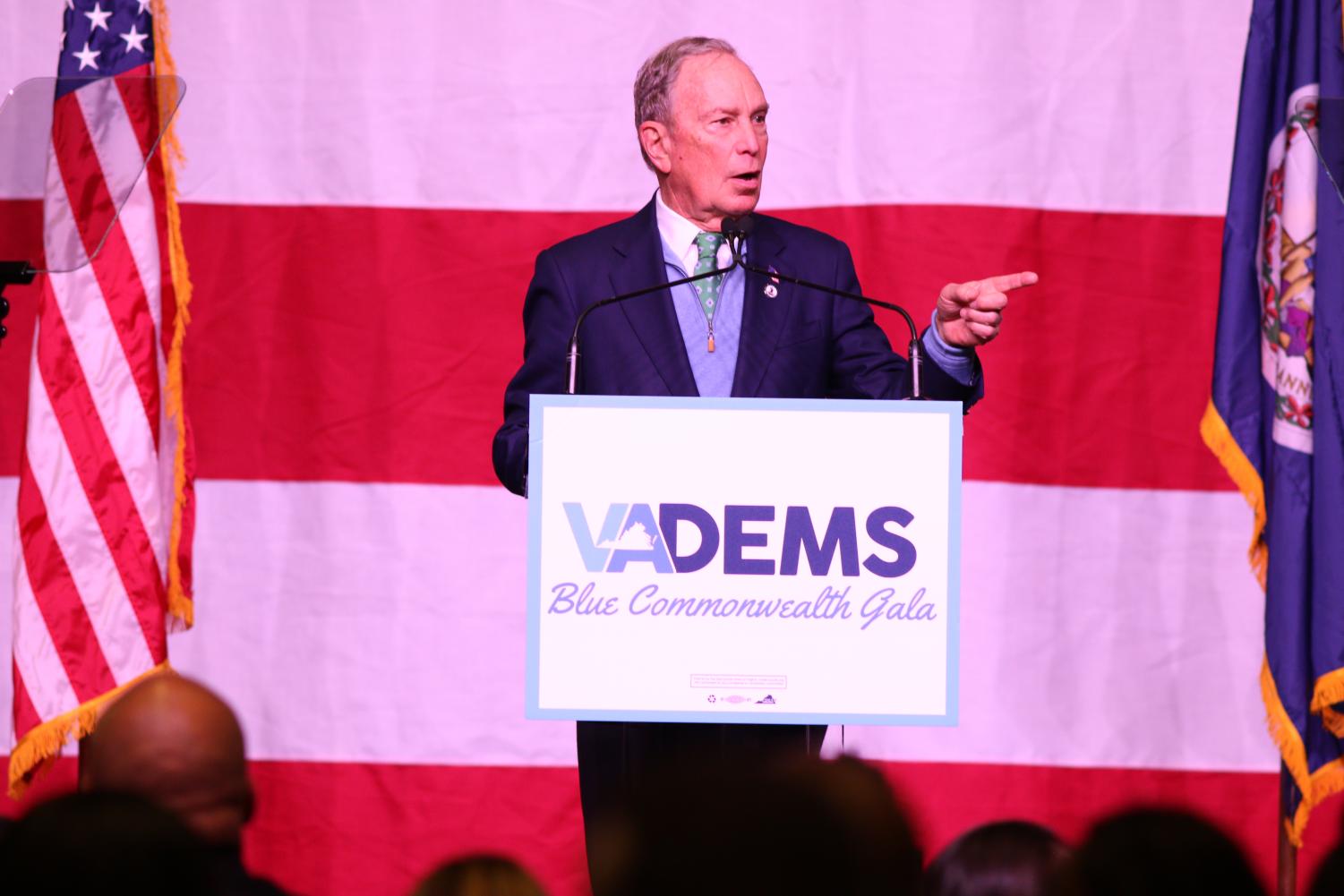A Tale of Two Candidates
Staffer reports most recent Democratic debate
March 2, 2020
“We are looking at a party that has decided that we’re either going to support someone who is a Democratic Socialist or somebody who has a long history of being a Republican. […] If we cannot pull this party together, if we go to one of those extremes, we take a terrible risk of reelecting Donald Trump.”
This quote from former presidential candidate Tom Steyer from the recent debate in Charleston, SC accurately illustrates the Democratic Party’s current dilemma on how to defeat Trump. Bernie Sanders is aiming for a total 180 of Trump’s policies: healthcare for all, taxes on the wealthy, and directly attacking climate change. On the other hand, Mike Bloomberg is playing a tad too safe, only promoting relatively non-extreme ideas like stopping gun violence, keeping Israel and Palestine’s two-state solution, and withdrawing many, but not all, troops from the Middle East.
“We have to be able to stop terrorism,” Bloomberg said. “And there’s no guarantees that you’re going to be able to do it, but we have to have some troops in places where terrorists congregate, and to not do so is just irresponsible.”
His less risque policies plus his extreme efforts in advertising makes it look like he’s attempting to appeal to centrists and those who aren’t super involved in politics to get those on the fence to vote Democrat. The other candidates have expressed the viability of this strategy.
“Donald Trump’s worst nightmare is having someone that the people in the middle, who are tired of the insults, and the extremes in our politics have someone to vote for,” candidate Amy Klobuchar said.
However, Sanders isn’t having any of it. He is very passionate about his socialist policies, essentially advertising himself as the antithesis to Trump rather than a mere “alternative,” as Steyer put it.
“What the American people want, by the way, and a lot of the issues we’ll be discussing tonight are issues I raised four years ago,” Sanders said. “Raising the minimum wage to a living wage, 15 bucks an hour. Making public colleges and universities tuition-free. And finally, doing what every other major country on Earth does, guaranteeing health care to all people as a human right through a Medicare for All, single-payer system.”
This method seems to be equally effective, judging by the fact he’s won 47 of the 50 latest national polls on who the people would want as president. Something he also flaunted is the grassroots nature of his movement, support base, and funding.
“If you want to beat Trump, what you’re going to need is an unprecedented grassroots movement of black and white and Latino, Native American and Asian, people who are standing up and fighting for justice,” Sanders said.
Other candidates also pride themselves on their grassroots support, but it’s Sanders’ more extreme policies and his passion about them that makes him stand out. The outlandishness of abolishing the current health insurance plans and spending trillions on Medicare for All, along with his other socialist standings, made him a big center of attention and receiver of criticism on the stage.
“Bernie and I both want to see universal health care, but Bernie’s plan doesn’t explain how to get there, doesn’t show how we’re going to get enough allies into it, and doesn’t show enough about how we’re going to pay for it,” Elizabeth Warren said. “I dug in. I did the work. And then Bernie’s team trashed me for it.”
“If you think the last four years has been chaotic, divisive, toxic, exhausting, imagine spending the better part of 2020 with Bernie Sanders vs. Donald Trump,” Pete Buttigieg commented.
“[Mike Pence] voted for a death bill, and supported the NRA,” Bloomberg said. “And certainly Senator Sanders has supported the NRA.”
Sanders’ controversy is the key to why he’s winning all those polls and has so much support. Everyone loves controversy, and in a time where debates are no less than a spectator sport to the average American, it’s fun to see this kind of extreme discourse. It’s why Trump’s bombastic, no-nonsense persona won over so many in 2016 that he got elected and began this whole mess.
“Let us be clear, do we think health care for all, Pete, is some kind of radical communist idea?” Sanders asked. “Do we think raising taxes on billionaires is a radical idea? Do you think criminal justice reform is a radical idea?”
Sanders’ “radical ideas” give him the constant media attention that gave Trump the advantage in 2016. That, plus his notoriety in the previous election season, makes him the only person on the debate stage the average Joe would recognize beforehand.
Other than Mike Bloomberg.
“With bold leadership, Mike Bloomberg rebuilds by delivering on jobs, healthcare, and affordable housing,” Bloomberg’s ads repeat ad infinitum. “He’ll beat Trump, raise taxes on the wealthy, and improve health care and create jobs.”
Being the CEO of a media company, Bloomberg probably understands the importance of a media presence when it comes to a successful presidential campaign. Except unlike Bernie and Trump, whose rises to fame came about naturally through having agreeable policies and memeable personas, Bloomberg is forcing himself into the public consciousness by buying ad space on Youtube and television. This type of brute-forcing strategy means the policies he stands for may have to take a hit. Bloomberg only advertises safe things to stick by, keeping his more polarizing stances like statehood for Puerto Rico in his website, away from the public eye.
“I don’t care how much money Mayor Bloomberg has,” Warren said. “The core of the Democratic Party will never trust him. And the fact that he cannot earn the trust of the core of the Democratic Party means he is the riskiest candidate standing on this stage.”
On the other hand, Sanders completely embraces his controversial standings. His social media presence is all about him being someone the people trust and the corporate bad guys fear for trying to shake the status quo.
“The billionaire class is getting nervous, and they should,” Sanders said in an IGTV video. “The people in Iowa and across America are sick and tired of status quo politics. And they want a government that will work for all of us, not just wealthy campaign contributors.”
Sanders isn’t afraid to state that he’s going to abolish all private health care, while Bloomberg got defensive over anything that could damage his image, such as the whole debacle with keeping his workers under non-disclosure agreements.
“Nobody accused me of doing anything other than just making a comment or two,” Bloomberg said. “And what [Warren] did suggest was that we release these women from the non-disclosure agreement. I did that two days later, and my company has said we will not use non-disclosure agreements ever again. […] We’re following exactly what she asked to do. […] We just cannot continue to re-litigate this every time. We did what she asked. And, thank you, we’ve probably made the world better because of it.”
Bloomberg is trying to keep a clean image to make himself presentable to the public, just like a company tries to keep a brand-friendly image to not alienate the public and possibly lose out on profit. Meanwhile, Bernie is putting all his eggs in the basket of being a controversial figure to challenge the status quo of Wall Street and the pharmaceutical industry. He feels like a genuine person setting out to make tangible change, and gets the help of genuine people to fund his campaign.
“The truth is, Pete, the American people support my agenda,” Sanders said. “That is why I am beating Trump in virtually every poll that is done, and why I will defeat him.”
So the big question for the Democratic Party is: which strategy will they take to defeat Trump in 2020? Will they play it safe to attract centrists and the politically illiterate like Bloomberg, or go full-on revolution like Sanders? Only the results of Super Tuesday will tell.







Kyle Pechacek • Mar 2, 2020 at 11:55 pm
I think that Bernie almost acts like a communist and he hates the rich and represents the poor when he’s a multi millionaire who doesn’t care about people who aren’t as fortunate as many of us are, I feel that he just wants the votes and to make everything free when it’s impossible. In reality he’s just going to tax all of us more, making it almost pointless to actually make things “free” when we get higher taxes and have to pay more frequently for things that many of us don’t need or use.